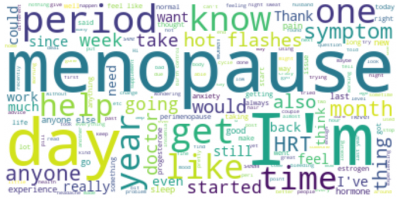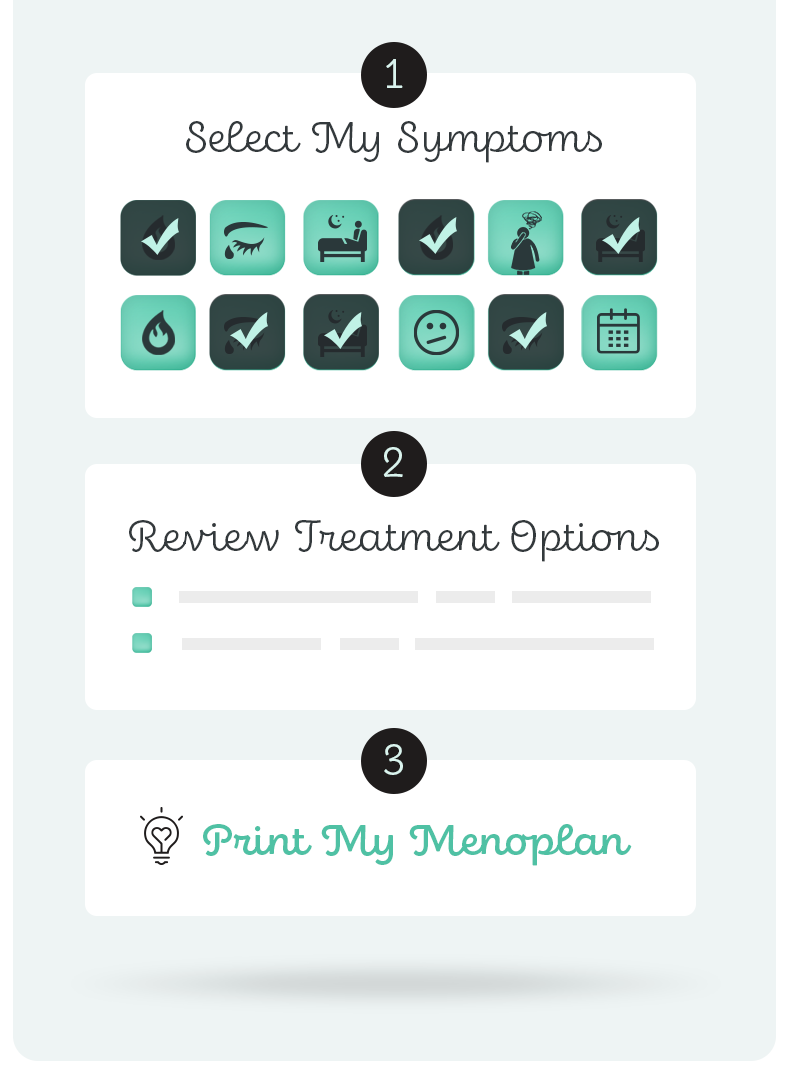About

QUESTIONS AND ANSWERS
What is Perimenopause? Perimenopause begins when the time from one period to the next varies by at least 7 days. It extends through menopause (the last menstrual period) to 1 year after menopause. Perimenopause nearly always happens with natural menopause, not induced menopause (menopause due to surgical removal of the ovaries or other medical treatments).
What is the Menopause transition? The span of time from when periods begin changing to the date of the final menstrual period.
What is menopause? Menopause is when your periods permanently stop. If you have your uterus and ovaries you are menopausal when you have 12 months in a row without a period. Natural menopause happens because of changes in the ovaries. As you age, the number of eggs in the ovaries decreases. Gradually the ovaries quit making the hormones that prepare your body for pregnancy. The date of your final menstrual period is your date of menopause. If you have both your ovaries removed before your periods have stopped your date of surgery is your date of menopause, and you are postmenopausal.
Natural menopause: This is the term used for menopause that happens at age 40 and above, and is not due to removal of both ovaries, medications or radiation. The body is going through the normal reproductive changes of aging.
Early menopause/premature menopause: Menopause that happens before age 40. It may be genetic, or due to autoimmune disorders, medical procedures or treatments, or surgery to remove both ovaries.
Primary ovarian insufficiency (POI). Sometimes called premature ovarian failure, this condition that happens at age less than 40 when many periods in a row are skipped or there are no periods at all. This can be a sign of menopause or of very few eggs left in the ovaries. POI differs from premature menopause because ovarian activity may start again.
Surgical menopause: Menopause that happens when both ovaries are surgically removed before a woman has reached a natural menopause. Surgery will cause menopause suddenly, and as a result, the symptoms may be more severe.
Induced menopause: Menopause that happens earlier than expected when both ovaries are surgically removed or permanently damaged by cancer treatments (pelvic radiation or chemotherapy) or other medical treatments before a woman has reach a natural menopause.
Premenopause: The time from puberty (onset of menstrual periods) to perimenopause.
Menopause transition: The span of time from when periods begin changing to the date of the final menstrual period.
Perimenopause: Perimenopause begins when the time from one period to the next varies by at least 7 days. It extends through menopause (the last menstrual period) to 1 year after menopause. A woman who is perimenopausal may have an induced menopause if her ovaries are removed or medical therapy damages her ovaries before she reaches her last period.
Menopause: The final menstrual period, which can be confirmed after 12 months in a row without a period. This time marks the end of menstruation and fertility. It is a normal, natural event associated with reduced functioning of the ovaries, resulting in lower levels of ovarian hormones (primarily estradiol).
Late menopause: A vague term used to indicate menopause that occurs later in the normal range of menopause.
Postmenopause: The span of time after menopause (the final menstrual period).
- NOTE: This Timeline can shift due to certain surgery, medications, or radiation.
The median age of natural menopause (last menstrual period) is 50-52 years. The median age of perimenopause is 47.5 years. Median means half are at a younger age and half are at an older age.
Natural menopause happens because the ovaries gradually stop making estradiol. As estradiol production decreases women enter perimenopause.
Other causes of menopause include surgical removal of the ovaries, or drugs like chemotherapy that damage the ovaries.
Earlier menopause can happen with:
- Smoking (0.8-1.7 yrs earlier)
- Living at very high altitude (Andes, Himalayas)
- Hysterectomy – even if the ovaries are not removed.
- Lower income and education levels (probably due to other health conditions)
- Shorter menstrual cycle length
- Tubal ligation (a rare cause)
Later menopause can happen with:
- Use of oral contraceptives
- More months of breast feeding
- Higher number of pregnancies
In this case, one way to tell a woman is becoming perimenopausal is when she starts having symptoms such as hot flashes or trouble sleeping. Her health care provider can do blood tests to check her hormones and see if she is perimenopausal or postmenopausal.
Read more about symptoms.
Read more about treatments.
The median length of time women have hot flashes and night sweats is 7.4 years (median means right in the middle – for half of women it is longer and for half it is shorter).
How long hot flashes and night sweats occur varies depending on race/ethnicity:
- Non-Hispanic white women (6.5 years)
- Hispanic/Latino women (8.9 years)
- African American Women (10.1 years)
- Japanese women (4.8 years)
- Chinese women (5.4 years)
The duration is longest in women who begin having hot flashes or night sweats when they are pre or peri menopausal (11.8 years).
The duration is shortest in women who begin having hot flashes or night sweats after their periods have stopped. (3.4 years)
The duration is longer in those with younger age at 1st experience of hot flashes/night sweats, ever smokers, women with a greater BMI, women with higher symptom sensitivity, anxiety, perceived stress, and depressive symptoms.
The duration is shorter in women who are married or partnered, women with a higher educational level and less financial strain, and those with greater social support.
The median duration of symptoms after the final menstrual period is 4.5 years.
Some perimenopause/menopause symptoms resolve once women are postmenopausal and their hormone fluctuations settle down. But other symptoms may continue either because of low estrogen levels, or because they are also a part of normal aging.
These symptoms most often resolve with time.
Hot flashes and night sweats
Mood, depression and anxiety
Heavy irregular periods
Brain fog / cognitive issues
Weight gain
These symptoms are more likely to continue.
Sleep problems / insomnia
Low sex drive
Pain during sex
Vaginal pain, dryness (not during sex)
Bladder control problems
Dry eyes
Dry hair and skin
Physical aches and pains
You may wonder if you can have your hormone levels tested to see if you are in the menopause transition or postmenopausal. Usually this isn’t necessary- or even helpful – for most women. That’s because hormone levels go up and down during your menstrual cycle and can have large and irregular swings during the menopause transition.
For most women, the best way to know if you are perimenopausal or in the menopause transition is to notice changes in your periods and whether you have menopause symptoms. Our tool, Am I In Menopause? , can tell you your menopause stage.
Hormone testing can help some women.
- If your periods stop when you are unusually young (under age 40), your health care provider may test your hormones to see what is happening.
- If you had a hysterectomy before your periods stopped and kept at least one ovary, or if you are using hormonal contraceptives that cause your period to stop (like the progesterone IUD), you may get your hormones tested to see if you are in the menopause transition.
- If you are over 50 years of age and are taking combined hormonal contraceptives and are still having periods, you may get your hormones tested when you are on the last day of your placebo pills week (week 4 in a pill pack). Combined hormonal contraceptives can hide the symptoms of menopause.
If your health care provider thinks you need a hormone test, a small blood sample will be drawn. Usually your FSH (follicle stimulating hormone) level will be measured. The test is often done twice, at least 4 weeks apart. Your estradiol level may also be tested. An FSH higher than 30 mIu/ml with estradiol less than 50 pg/mL is a good sign that you are perimenopausal or have reached menopause.
You may wonder, what smoking has to do with menopause. Women who smoke cigarettes are more likely to have hot flashes, to have more of them, and to have more severe hot flashes during the menopause transition. They also tend to begin the menopause transition at an earlier age. And, the menopause transition is usually longer in women who begin the transition at an earlier age. Never smoking is even better. Non-smokers have fewer and less severe hot flashes compared to smokers.
Other forms of nicotine, such as vaping, have not been studied for their effect on menopause symptoms. Nor is there good quality research on the effects of marijuana, THC, or CBD oil, despite some of the current hype about CBD oil.
The positive effects of quitting smoking on hot flashes and night sweats don’t happen until 5 years after quitting. Quitting smoking before menopause is associated with fewer hot flashes and less severe hot flashes. The earlier you quit before you begin the menopause transition the greater the impact.
There are lots of reasons to quit smoking. Add hot flashes to the list.
If you want to quit smoking there are great free resources to help you quit. Two of our favorites are:
- https://women.smokefree.gov/ by the U.S. National Institutes of Health, and
- https://www.becomeanex.org/ by the non-profit Legacy Foundation.
- Avid NS, Crawford SL, Greendale G et al. Duration of menopausal vasomotor symptoms over the menopause transitions. JAMA Intern Med Feb 16, 2016.
- Harlow SD, Gass M, Hall JE, Lobo R, Maki P, Rebar RW, Sherman S, Sluss PM, de Villiers TJ; STRAW + 10 Collaborative Group. Executive summary of the Stages of Reproductive Aging Workshop + 10: addressing the unfinished agenda of staging reproductive aging. J Clin Endocrinol Metab. 2012 Apr;97(4):1159-68. doi: 10.1210/jc.2011-3362. Epub 2012 Feb 16. PMID: 22344196; PMCID: PMC3319184.
- http://www.menopause.org/for-women/menopause-glossary North American Menopause Society, Menopause Glossary, Accessed May 6, 2019
- Midgette AS, Baron JA. Cigarette smoking and the risk of natural menopause. Epidemiology 1990;1:474-480. (review article)
- Smith RL, Flaws JA, Gallicchi L. Does quitting smoking decrease the risk of midlife hot flashes? A longitudinal analysis. Maturitas.82(1): 123–127. doi:10.1016/j.maturitas.2015.06.029.
- Treloar AE, Boynton RE, Behn BG, et al. Variation of the human menstrual cycle through reproductive life. Int J Fertil. 1966; 12(Pt 2):77–126. [PubMed: 5419031]
- Zhu D, Chung H-F, Pandeya N, Dobson, AJ, Cade JE, Greenwood DC, et al. Relationships between intensity, duration, cumulative dose, and timing of smoking with age at menopause: A pooled analysis of individual data from 17 observational studies. PLoS Med 2018;15(11): https://doi.org/10.1371/journal.pmed.1002704


